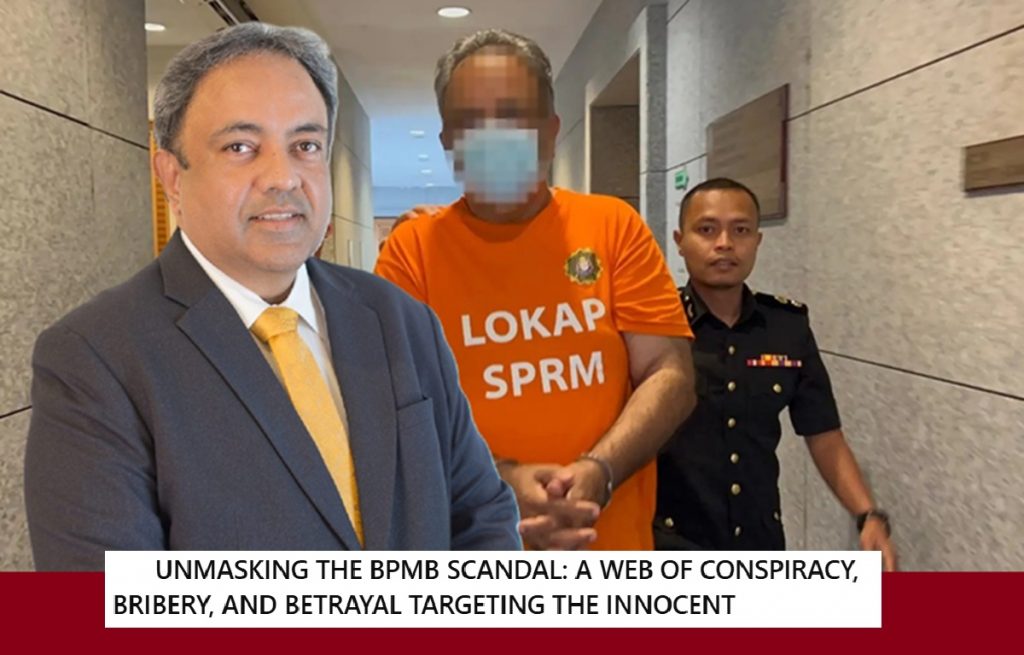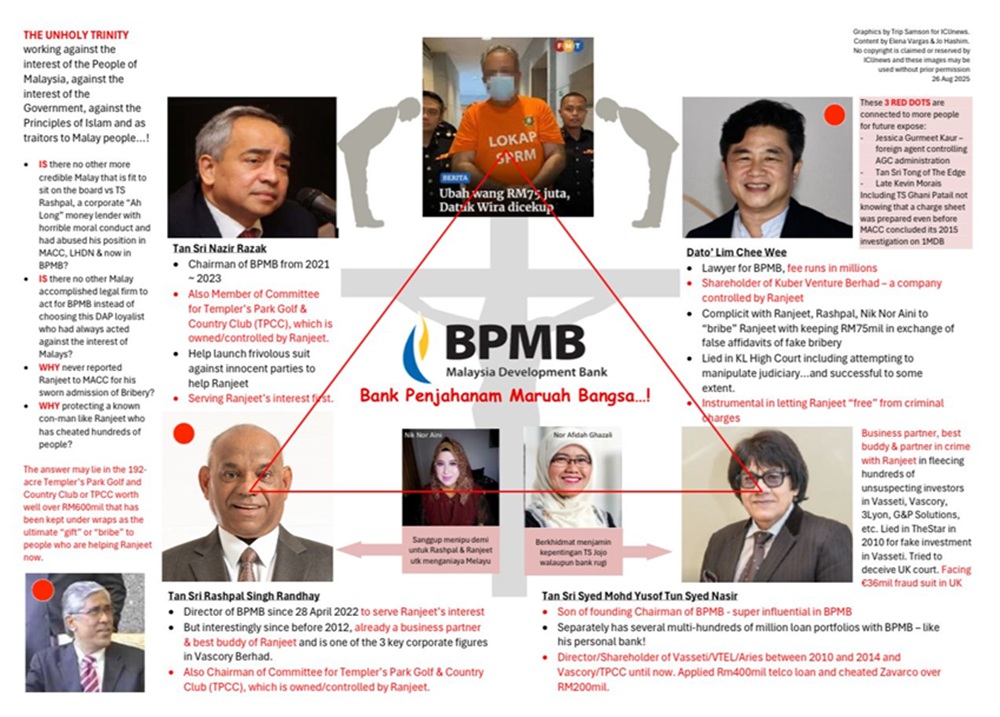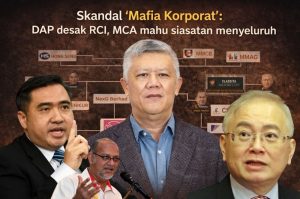
By Elena Vargas,
Independent Corporate Investigative Journalists @ICIJnews

In the shadowy corridors of Malaysia’s financial institutions, where billions in public funds are meant to fuel national development, a chilling conspiracy has unfolded – one that reeks of corruption, collusion, and a blatant disregard for justice. At the heart of this saga is Bank Pembangunan Malaysia Berhad (BPMB), a Malaysian Development Financial Institution mandated to provide medium to long-term financing to the country’s infrastructure, maritime, and oil C gas technology sectors, wholly owned by the Malaysian government through the Minister of Finance.
Instead, it appears to have become a vehicle for protecting the guilty while ensnaring the innocent in a RM564 million legal quagmire. Drawing from explosive court documents in the case of Paneagle Sdn Bhd v. Nik Nor Aini Nik Mohamed C Ors (Suit WA-23NCvC-72-08/2025 (“Suit 72″) or the “Suit to Set Aside Sham Consent Judgment”, this investigation reveals how BPMB, aided by its lawyer Dato’ Lim Chee Wee and key figures like Ranjeet Singh Sidhu (also known as Datuk Wira Ranjeet Singh Sidhu) and possibly influenced by high- profile connections such as the son of the founding chairman of BPMB, Tan Sri Syed Mohd Yusof Tun Syed Nasir and Ranjeet’s long time business partner and current BPMB director, Tan Sri Rashpal Singh Randhay, orchestrated a scheme to shield perpetrators of a massive loan fraud while targeting unrelated parties like Paneagle Sdn Bhd and 27 others!
This isn’t just a tale of financial mismanagement; it’s a provocative exposé of how powerful entities weaponise the courts to bury their sins. As an independent journalist who has spent years peeling back the layers of corporate malfeasance in Southeast Asia, I’ve seen my share of scandals – from phantom investments to rigged tenders – but the BPMB conspiracy stands out for its audacity. Here, a state-backed bank, sworn to uphold public trust, allegedly traded justice for fabricated affidavits, allowing RM75 million in misappropriated funds to vanish into the pockets of the connected few. The victims? Innocent companies like Paneagle, dragged into frivolous claims with no direct link to the original loan debacle.
Let’s rewind to 2012. BPMB disbursed a RM400 million loan to Aries Telecoms (M) Berhad for a fibre optic network project – a noble endeavour on paper. But within 48 hours of the first RM200 million tranche hitting Aries’ accounts, RM75 million flowed straight to companies linked to Ranjeet Singh Sidhu: RM50 million to GCP Solutions Sdn Bhd and RM25 million to Rothchilds Capital (I) Sdn Bhd. Court records from an earlier suit WA-22NCC-313-07/2018 (“Suit 313“) confirm BPMB knew about this as early as November 19, 2018. Yet, instead of clawing back the funds or alerting authorities, BPMB sat idle, allowing the statute of limitations to tick away.
Fast-forward to 2022, when BPMB launched Suit No. WA-22NCC-264-06/2022 (“Suit 264”), a RM564 million claim against 30 defendants, including Ranjeet, his associate Noorusa’adah Binti Othman (Sa’adah), and unrelated entities like Paneagle. The suit alleged a bribery scheme involving Dato’ Zafer, a BPMB officer, to facilitate the loan disbursements – the so-called “Zafer Bribe.” Ranjeet and Sa’adah provided self-incriminating affidavits admitting to arranging RM8 million and RM5.5 million bribes, respectively. But here’s the twist: these affidavits were allegedly procured through collusion, with BPMB rewarding them via consent judgments that let them off the hook for peanuts – RM500,000 for Ranjeet and RM2.5 million for Sa’adah – while parading a façade of recovery attempt against others.
The Malaysian Anti-Corruption Commission (MACC) had already issued No Further Action (NFA) letters in 2022 to the victims of this conspiracy initiated by Ranjeet and supported by Rashpal in late March 2021, effectively clearing them of bribery allegations. Even Zafer himself received an NFA posthumously. Yet BPMB pressed on, ignoring these exonerations to prop up a baseless claim.
Why? The Suit to Set Aside Sham Consent Judgment alleges a grand conspiracy: BPMB, under the direction of its Head of Recovery Nik Aini Nik Mohamed (Nik Nor Aini), collaborated with Ranjeet from the outset. Lim Chee Wee Partnership (LCWP), BPMB’s lawyers, played puppet master, drafting the suit and advising on the consent judgments. Lim Chee Wee himself had prior investments in a company tied to Ranjeet – Kuber Venture Berhad – raising glaring conflicts of interest.

Tan Sri Rashpal’s shadow looms large here, though details remain murky. Whispers in corporate circles suggest his influence may have shielded Ranjeet, a serial litigant with a trail of judgments against him totalling over RM600 million for fiduciary breaches and misappropriations. Media reports from 2023-2025 paint Ranjeet as an “elite scammer,” with MACC raids seizing RM620 million in assets linked to money laundering from the Aries loan. Yet BPMB never reported him, despite mandatory obligations under the MACC Act 2009. This omission isn’t negligence – it’s complicity.
The conspiracy’s victims are clear: parties like Paneagle, a private company with no contractual ties to the Aries loan, now face ruinous claims.
BPMB’s actions have inflicted reputational damage, legal costs, and operational chaos, all while Ranjeet walks free with RM75 million in ill-gotten gains. This isn’t justice; it’s a rigged game where the bank uses taxpayer funds to fund frivolous suits, targeting innocents to deflect from its own failures.
Highlighting the Wrongdoings: A Damning List from Court Documents
Based on the Statement of Claim as seen in Suit WA-23NCvC-72-08/2025 (“Suit 72″) the perpetrators – BPMB, Nik Nor Aini, Ranjeet, Sa’adah, and LCWP (led by Lim Chee Wee) – engaged in a litany of egregious acts. These are not mere allegations but facts pleaded with supporting evidence, including affidavits, bank statements, and MACC letters. Here’s a breakdown:
1. Concerted Conspiracy to Absolve Culprits: The defendants conspired to release Ranjeet and Sa’adah from the RM564 million claim via consent judgments, despite their admissions to receiving/arranging RM75 million in bribes. This shifted full liability to innocent parties like Paneagle, with no nexus to the loan (paras 11- 15, 17-21).
2. Fabrication and Collusion in Affidavits: Ranjeet and Sa’adah provided self- incriminating affidavits (Enclosures 138 and 181) under duress or inducement from BPMB and LCWP, fabricating the Zafer Bribe narrative despite MACC’s NFAs. This was a sham to bolster Suit 264 (paras 18-20, 26-29, 85, 118-124).
3. Preferential Treatment as Gratification/Bribery: BPMB offered “bribes” in the form of consent judgments and non- reporting to MACC, allowing Ranjeet to retain RM75 million in exchange for false affidavits. This violates Sections 17A, 25, 48, and 53 of the MACC Act 2009 (paras 24-25, 30-31, 110-114, 139-142). This was all done to showcase BPMB as performing an overarching act towards loan recovery whilst the reality is it was an act to relieve Ranjeet and Sa’adah from liability to BPMB and celebrated as cooperating witness.
4. Concealment of Material Facts from Court: Nik Nor Aini and LCWP hid Ranjeet’s RM75 million receipt during Mareva injunction applications and consent judgment hearings, misleading the court and denying fair trials (paras 79-80, 158-162, 194-195).
5. Failure to Report Crimes: Despite knowing since 2018, BPMB/LCWP never reported Ranjeet’s misappropriation or bribery admissions to MACC/PDRM, committing offenses under mandatory reporting laws. This occurred across 15 documented instances from 2018-2025 (paras 22-23, 49-50, 105-106, 127-137, 171-172; detailed table in paras 168-170).
6. Artificial and Sham Litigation: Suit 264 was filed as a theatrical act, cooperating with Ranjeet from day one to appear diligent in recovery while shielding him. No defense was filed by Ranjeet/Sa’adah, and BPMB ignored counterclaims in Suit 313 (paras 25, 32-33, 72- 76, 140-142).
7. Conflict of Interest and Abuse of Position: Lim Chee Wee held shares in Ranjeet’s linked company (Kuber Venture Berhad), creating undisclosed conflicts. Nik Nor Aini abused her role as Head of Recovery to ignore evidence and authorise the scheme (paras 143-148, 172- 186).
8. Violation of Statutory Duties: BPMB breached corporate liability under MACC Act Section 17A by not preventing bribery; LCWP aided in illegality, rendering consent judgments void under Contracts Act 1950 (paras 43, 191-196, 197-204).
9. Manipulation of Judicial Process: LCWP drafted documents to favor BPMB/Ranjeet, inducing false testimony and using consent judgments as a façade for quid pro quo (paras 197-204).
10. Causing Harm to Innocents: The scheme inflicted RM10 million in damages on Paneagle through delays, costs, and reputational harm, constituting tortious conspiracy (paras 210- 213).
These wrongdoings aren’t isolated slips; they’re a systematic abuse of power, turning a public institution into a tool for personal gain.
Probing the BPMB Board: Ǫuestions That Demand Answers
The BPMB Board, chaired by figures entrusted with oversight of a government-owned entity, must explain how this festered under their watch. As stewards of public funds, your silence is deafening. Here are pointed questions:
1. How did the Board allow a glaring conflict of interest, where lawyer Lim Chee Wee had prior investments in Ranjeet’s companies, to persist without recusal or investigation?
2. Why was no internal probe launched into Nik Nor Aini’s repeated failures to report Ranjeet’s RM75 million misappropriation and bribery admissions, potentially making BPMB liable under MACC Act Section 17A?
3. Did the Board approve the consent judgments that let Ranjeet off for a mere RM500,000 in easy monthly instalments of RM100,000, while knowing he pocketed RM75 million – effectively a gratification for false affidavits? If not, who authorised this criminal omission?
4. In light of MACC’s 2025 raids on Ranjeet for money laundering, why hasn’t BPMB filed reports or joined recovery efforts ? Are Board members complicit in concealing crimes?
5. How do you justify targeting innocent parties like Paneagle with frivolous claims, while shielding Ranjeet and possibly Tan Sri Rashpal’s network? Is this cronyism at play? Or plain Corporate Mafia in control?
6. What measures has the Board taken to prevent future conspiracies? Or is BPMB’s culture one of impunity, where whistleblowers are ignored and the guilty rewarded?
The Malaysian public deserves transparency. BPMB’s Board must respond – or risk being seen as enablers of this rot. As investigations mount, one thing is clear: the conspiracy’s architects may soon face the justice they’ve denied others. Stay tuned; this story is far from over.



